Reflective Evaluation of a Patient Care Episode: Nursing Practice
VerifiedAdded on 2022/08/08
|11
|3377
|29
Report
AI Summary
This report presents a reflective evaluation of a patient care episode, focusing on the experience of a nurse caring for an elderly patient diagnosed with dementia. The report utilizes Rolfe's Framework of Reflection to analyze the incident, including a description of the case, an analysis of the nurse's actions and decision-making processes, and a synthesis of the experience. The patient, referred to as Mr. A, accused a staff attendant of physical abuse, prompting the nurse to report the incident and navigate the complexities of the situation. The report delves into the ethical considerations, the nurse's role in advocating for the patient, and the importance of professional intuition in clinical practice. The analysis includes the actions of the chief nurse and the overall impact of the event on patient care and the nurse's professional development. The report concludes with reflections on the outcomes and insights gained, emphasizing the need for confident and critical care in similar future scenarios.
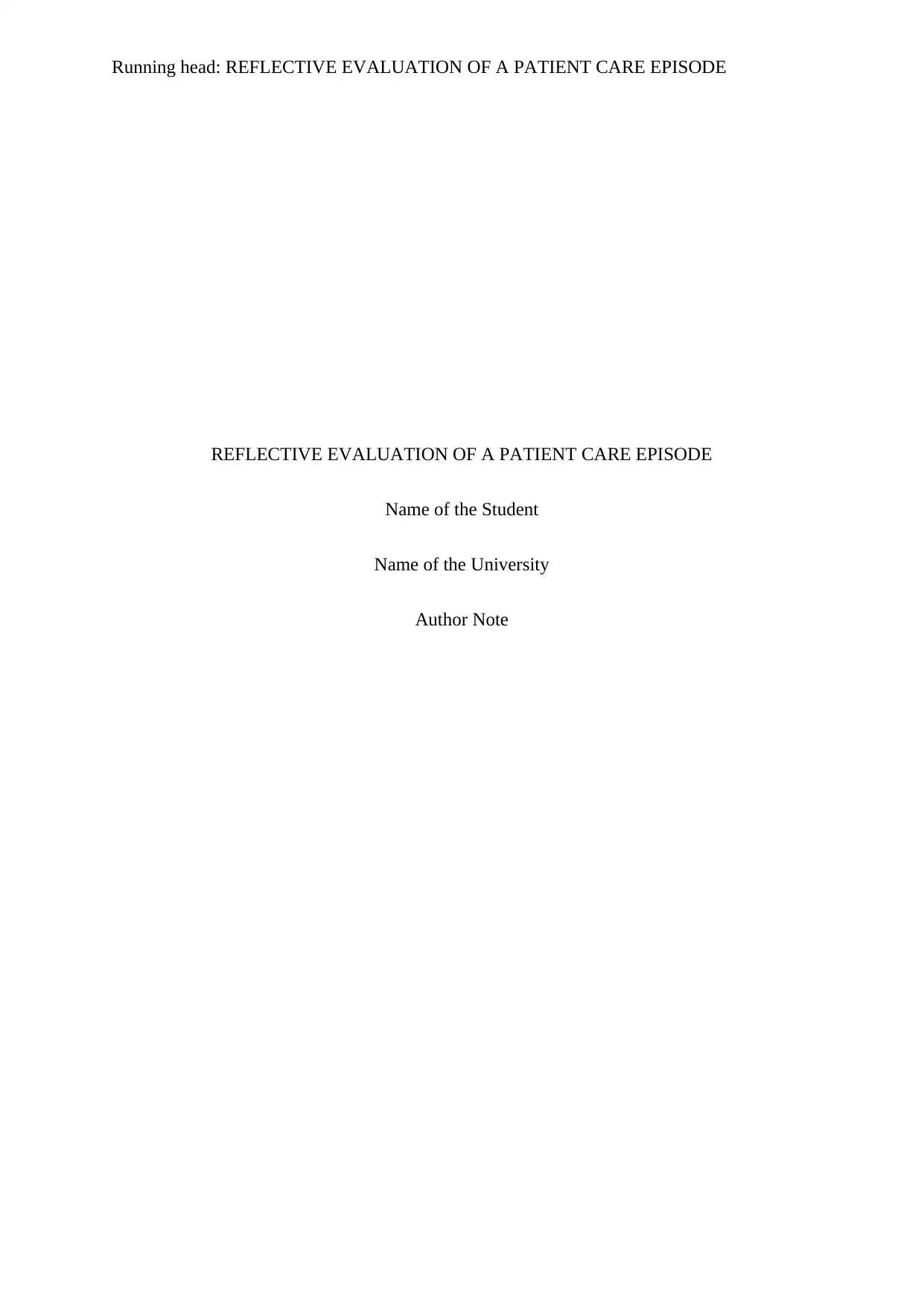
Running head: REFLECTIVE EVALUATION OF A PATIENT CARE EPISODE
REFLECTIVE EVALUATION OF A PATIENT CARE EPISODE
Name of the Student
Name of the University
Author Note
REFLECTIVE EVALUATION OF A PATIENT CARE EPISODE
Name of the Student
Name of the University
Author Note
Paraphrase This Document
Need a fresh take? Get an instant paraphrase of this document with our AI Paraphraser
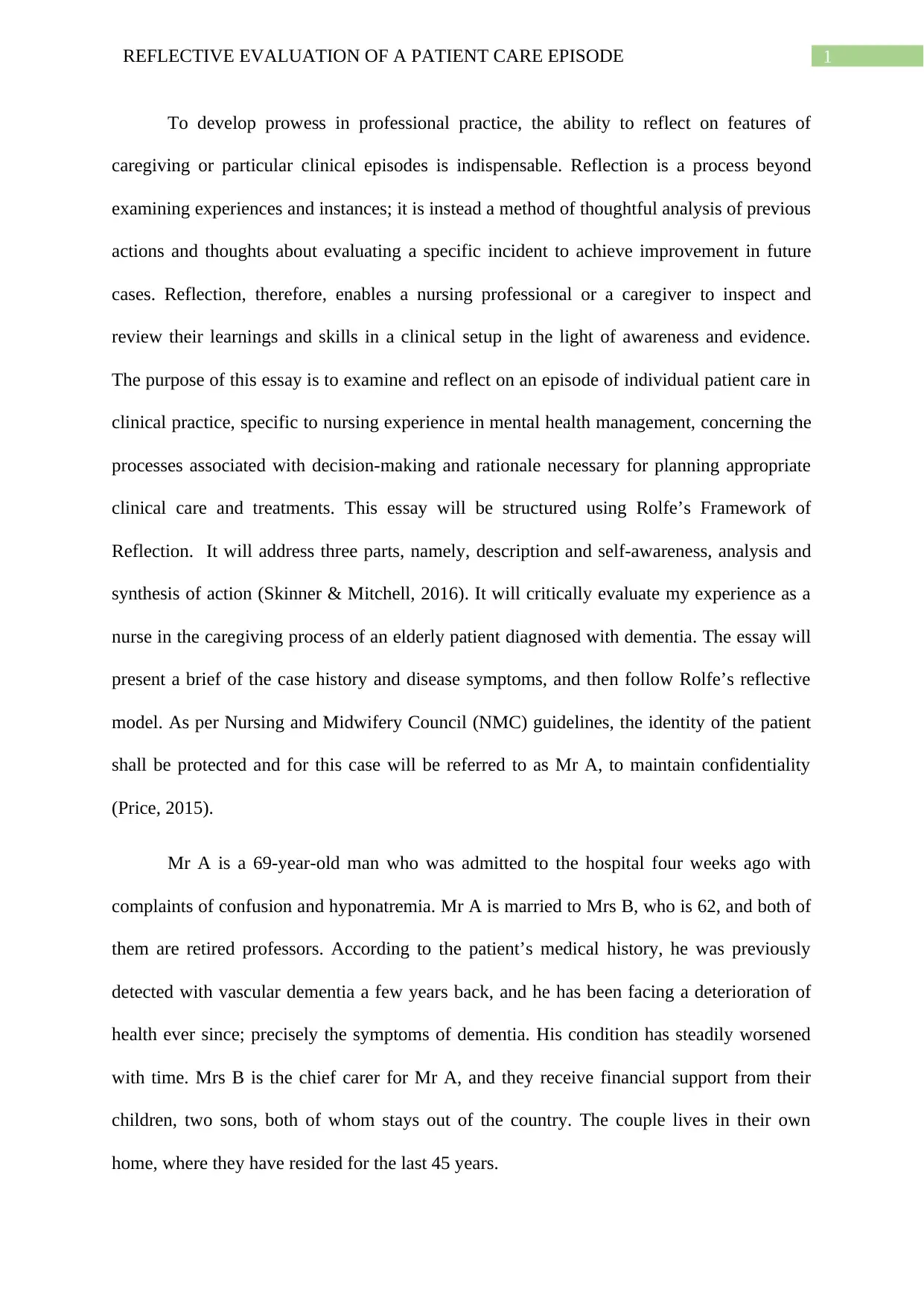
1REFLECTIVE EVALUATION OF A PATIENT CARE EPISODE
To develop prowess in professional practice, the ability to reflect on features of
caregiving or particular clinical episodes is indispensable. Reflection is a process beyond
examining experiences and instances; it is instead a method of thoughtful analysis of previous
actions and thoughts about evaluating a specific incident to achieve improvement in future
cases. Reflection, therefore, enables a nursing professional or a caregiver to inspect and
review their learnings and skills in a clinical setup in the light of awareness and evidence.
The purpose of this essay is to examine and reflect on an episode of individual patient care in
clinical practice, specific to nursing experience in mental health management, concerning the
processes associated with decision-making and rationale necessary for planning appropriate
clinical care and treatments. This essay will be structured using Rolfe’s Framework of
Reflection. It will address three parts, namely, description and self-awareness, analysis and
synthesis of action (Skinner & Mitchell, 2016). It will critically evaluate my experience as a
nurse in the caregiving process of an elderly patient diagnosed with dementia. The essay will
present a brief of the case history and disease symptoms, and then follow Rolfe’s reflective
model. As per Nursing and Midwifery Council (NMC) guidelines, the identity of the patient
shall be protected and for this case will be referred to as Mr A, to maintain confidentiality
(Price, 2015).
Mr A is a 69-year-old man who was admitted to the hospital four weeks ago with
complaints of confusion and hyponatremia. Mr A is married to Mrs B, who is 62, and both of
them are retired professors. According to the patient’s medical history, he was previously
detected with vascular dementia a few years back, and he has been facing a deterioration of
health ever since; precisely the symptoms of dementia. His condition has steadily worsened
with time. Mrs B is the chief carer for Mr A, and they receive financial support from their
children, two sons, both of whom stays out of the country. The couple lives in their own
home, where they have resided for the last 45 years.
To develop prowess in professional practice, the ability to reflect on features of
caregiving or particular clinical episodes is indispensable. Reflection is a process beyond
examining experiences and instances; it is instead a method of thoughtful analysis of previous
actions and thoughts about evaluating a specific incident to achieve improvement in future
cases. Reflection, therefore, enables a nursing professional or a caregiver to inspect and
review their learnings and skills in a clinical setup in the light of awareness and evidence.
The purpose of this essay is to examine and reflect on an episode of individual patient care in
clinical practice, specific to nursing experience in mental health management, concerning the
processes associated with decision-making and rationale necessary for planning appropriate
clinical care and treatments. This essay will be structured using Rolfe’s Framework of
Reflection. It will address three parts, namely, description and self-awareness, analysis and
synthesis of action (Skinner & Mitchell, 2016). It will critically evaluate my experience as a
nurse in the caregiving process of an elderly patient diagnosed with dementia. The essay will
present a brief of the case history and disease symptoms, and then follow Rolfe’s reflective
model. As per Nursing and Midwifery Council (NMC) guidelines, the identity of the patient
shall be protected and for this case will be referred to as Mr A, to maintain confidentiality
(Price, 2015).
Mr A is a 69-year-old man who was admitted to the hospital four weeks ago with
complaints of confusion and hyponatremia. Mr A is married to Mrs B, who is 62, and both of
them are retired professors. According to the patient’s medical history, he was previously
detected with vascular dementia a few years back, and he has been facing a deterioration of
health ever since; precisely the symptoms of dementia. His condition has steadily worsened
with time. Mrs B is the chief carer for Mr A, and they receive financial support from their
children, two sons, both of whom stays out of the country. The couple lives in their own
home, where they have resided for the last 45 years.
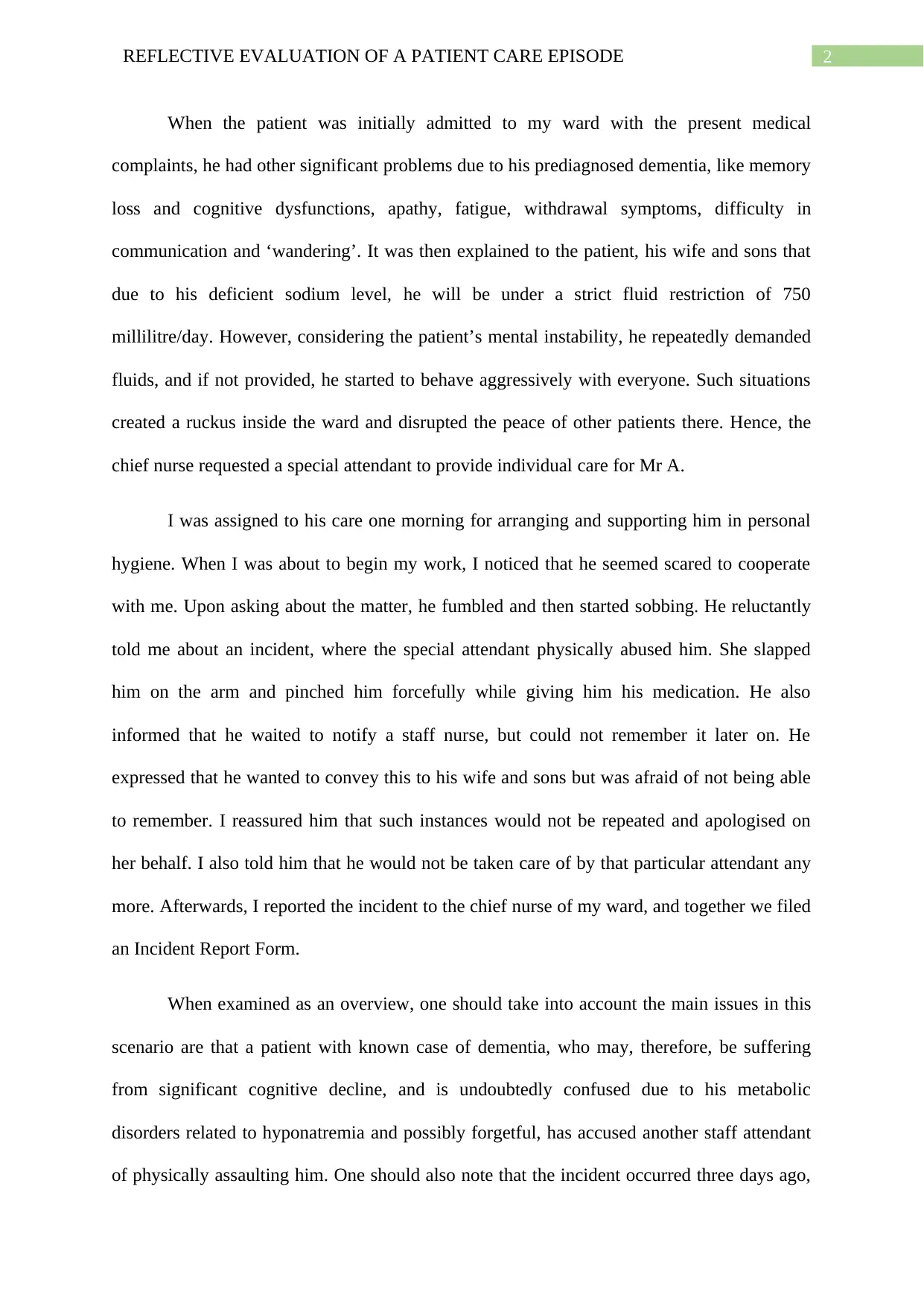
2REFLECTIVE EVALUATION OF A PATIENT CARE EPISODE
When the patient was initially admitted to my ward with the present medical
complaints, he had other significant problems due to his prediagnosed dementia, like memory
loss and cognitive dysfunctions, apathy, fatigue, withdrawal symptoms, difficulty in
communication and ‘wandering’. It was then explained to the patient, his wife and sons that
due to his deficient sodium level, he will be under a strict fluid restriction of 750
millilitre/day. However, considering the patient’s mental instability, he repeatedly demanded
fluids, and if not provided, he started to behave aggressively with everyone. Such situations
created a ruckus inside the ward and disrupted the peace of other patients there. Hence, the
chief nurse requested a special attendant to provide individual care for Mr A.
I was assigned to his care one morning for arranging and supporting him in personal
hygiene. When I was about to begin my work, I noticed that he seemed scared to cooperate
with me. Upon asking about the matter, he fumbled and then started sobbing. He reluctantly
told me about an incident, where the special attendant physically abused him. She slapped
him on the arm and pinched him forcefully while giving him his medication. He also
informed that he waited to notify a staff nurse, but could not remember it later on. He
expressed that he wanted to convey this to his wife and sons but was afraid of not being able
to remember. I reassured him that such instances would not be repeated and apologised on
her behalf. I also told him that he would not be taken care of by that particular attendant any
more. Afterwards, I reported the incident to the chief nurse of my ward, and together we filed
an Incident Report Form.
When examined as an overview, one should take into account the main issues in this
scenario are that a patient with known case of dementia, who may, therefore, be suffering
from significant cognitive decline, and is undoubtedly confused due to his metabolic
disorders related to hyponatremia and possibly forgetful, has accused another staff attendant
of physically assaulting him. One should also note that the incident occurred three days ago,
When the patient was initially admitted to my ward with the present medical
complaints, he had other significant problems due to his prediagnosed dementia, like memory
loss and cognitive dysfunctions, apathy, fatigue, withdrawal symptoms, difficulty in
communication and ‘wandering’. It was then explained to the patient, his wife and sons that
due to his deficient sodium level, he will be under a strict fluid restriction of 750
millilitre/day. However, considering the patient’s mental instability, he repeatedly demanded
fluids, and if not provided, he started to behave aggressively with everyone. Such situations
created a ruckus inside the ward and disrupted the peace of other patients there. Hence, the
chief nurse requested a special attendant to provide individual care for Mr A.
I was assigned to his care one morning for arranging and supporting him in personal
hygiene. When I was about to begin my work, I noticed that he seemed scared to cooperate
with me. Upon asking about the matter, he fumbled and then started sobbing. He reluctantly
told me about an incident, where the special attendant physically abused him. She slapped
him on the arm and pinched him forcefully while giving him his medication. He also
informed that he waited to notify a staff nurse, but could not remember it later on. He
expressed that he wanted to convey this to his wife and sons but was afraid of not being able
to remember. I reassured him that such instances would not be repeated and apologised on
her behalf. I also told him that he would not be taken care of by that particular attendant any
more. Afterwards, I reported the incident to the chief nurse of my ward, and together we filed
an Incident Report Form.
When examined as an overview, one should take into account the main issues in this
scenario are that a patient with known case of dementia, who may, therefore, be suffering
from significant cognitive decline, and is undoubtedly confused due to his metabolic
disorders related to hyponatremia and possibly forgetful, has accused another staff attendant
of physically assaulting him. One should also note that the incident occurred three days ago,
⊘ This is a preview!⊘
Do you want full access?
Subscribe today to unlock all pages.

Trusted by 1+ million students worldwide
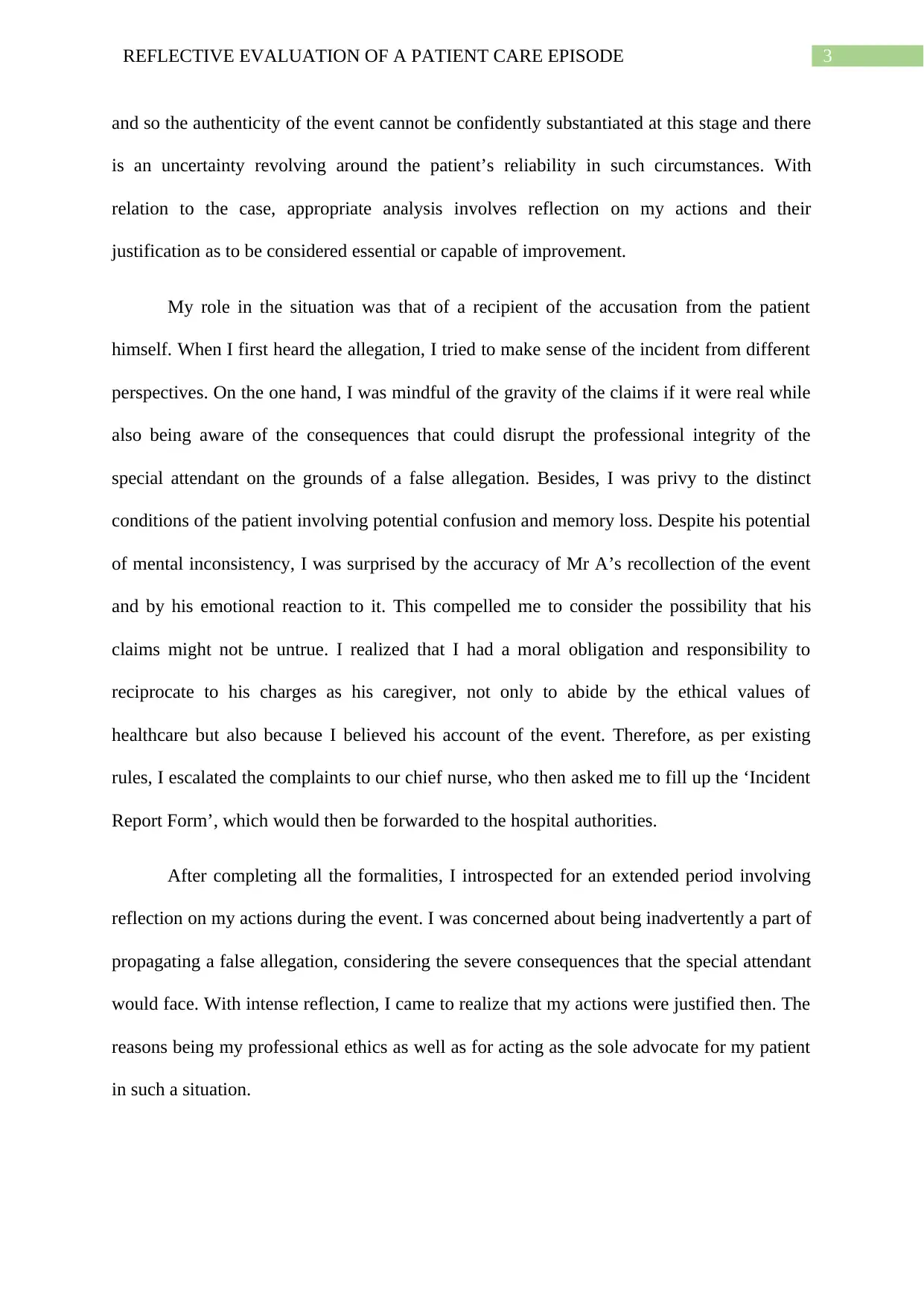
3REFLECTIVE EVALUATION OF A PATIENT CARE EPISODE
and so the authenticity of the event cannot be confidently substantiated at this stage and there
is an uncertainty revolving around the patient’s reliability in such circumstances. With
relation to the case, appropriate analysis involves reflection on my actions and their
justification as to be considered essential or capable of improvement.
My role in the situation was that of a recipient of the accusation from the patient
himself. When I first heard the allegation, I tried to make sense of the incident from different
perspectives. On the one hand, I was mindful of the gravity of the claims if it were real while
also being aware of the consequences that could disrupt the professional integrity of the
special attendant on the grounds of a false allegation. Besides, I was privy to the distinct
conditions of the patient involving potential confusion and memory loss. Despite his potential
of mental inconsistency, I was surprised by the accuracy of Mr A’s recollection of the event
and by his emotional reaction to it. This compelled me to consider the possibility that his
claims might not be untrue. I realized that I had a moral obligation and responsibility to
reciprocate to his charges as his caregiver, not only to abide by the ethical values of
healthcare but also because I believed his account of the event. Therefore, as per existing
rules, I escalated the complaints to our chief nurse, who then asked me to fill up the ‘Incident
Report Form’, which would then be forwarded to the hospital authorities.
After completing all the formalities, I introspected for an extended period involving
reflection on my actions during the event. I was concerned about being inadvertently a part of
propagating a false allegation, considering the severe consequences that the special attendant
would face. With intense reflection, I came to realize that my actions were justified then. The
reasons being my professional ethics as well as for acting as the sole advocate for my patient
in such a situation.
and so the authenticity of the event cannot be confidently substantiated at this stage and there
is an uncertainty revolving around the patient’s reliability in such circumstances. With
relation to the case, appropriate analysis involves reflection on my actions and their
justification as to be considered essential or capable of improvement.
My role in the situation was that of a recipient of the accusation from the patient
himself. When I first heard the allegation, I tried to make sense of the incident from different
perspectives. On the one hand, I was mindful of the gravity of the claims if it were real while
also being aware of the consequences that could disrupt the professional integrity of the
special attendant on the grounds of a false allegation. Besides, I was privy to the distinct
conditions of the patient involving potential confusion and memory loss. Despite his potential
of mental inconsistency, I was surprised by the accuracy of Mr A’s recollection of the event
and by his emotional reaction to it. This compelled me to consider the possibility that his
claims might not be untrue. I realized that I had a moral obligation and responsibility to
reciprocate to his charges as his caregiver, not only to abide by the ethical values of
healthcare but also because I believed his account of the event. Therefore, as per existing
rules, I escalated the complaints to our chief nurse, who then asked me to fill up the ‘Incident
Report Form’, which would then be forwarded to the hospital authorities.
After completing all the formalities, I introspected for an extended period involving
reflection on my actions during the event. I was concerned about being inadvertently a part of
propagating a false allegation, considering the severe consequences that the special attendant
would face. With intense reflection, I came to realize that my actions were justified then. The
reasons being my professional ethics as well as for acting as the sole advocate for my patient
in such a situation.
Paraphrase This Document
Need a fresh take? Get an instant paraphrase of this document with our AI Paraphraser
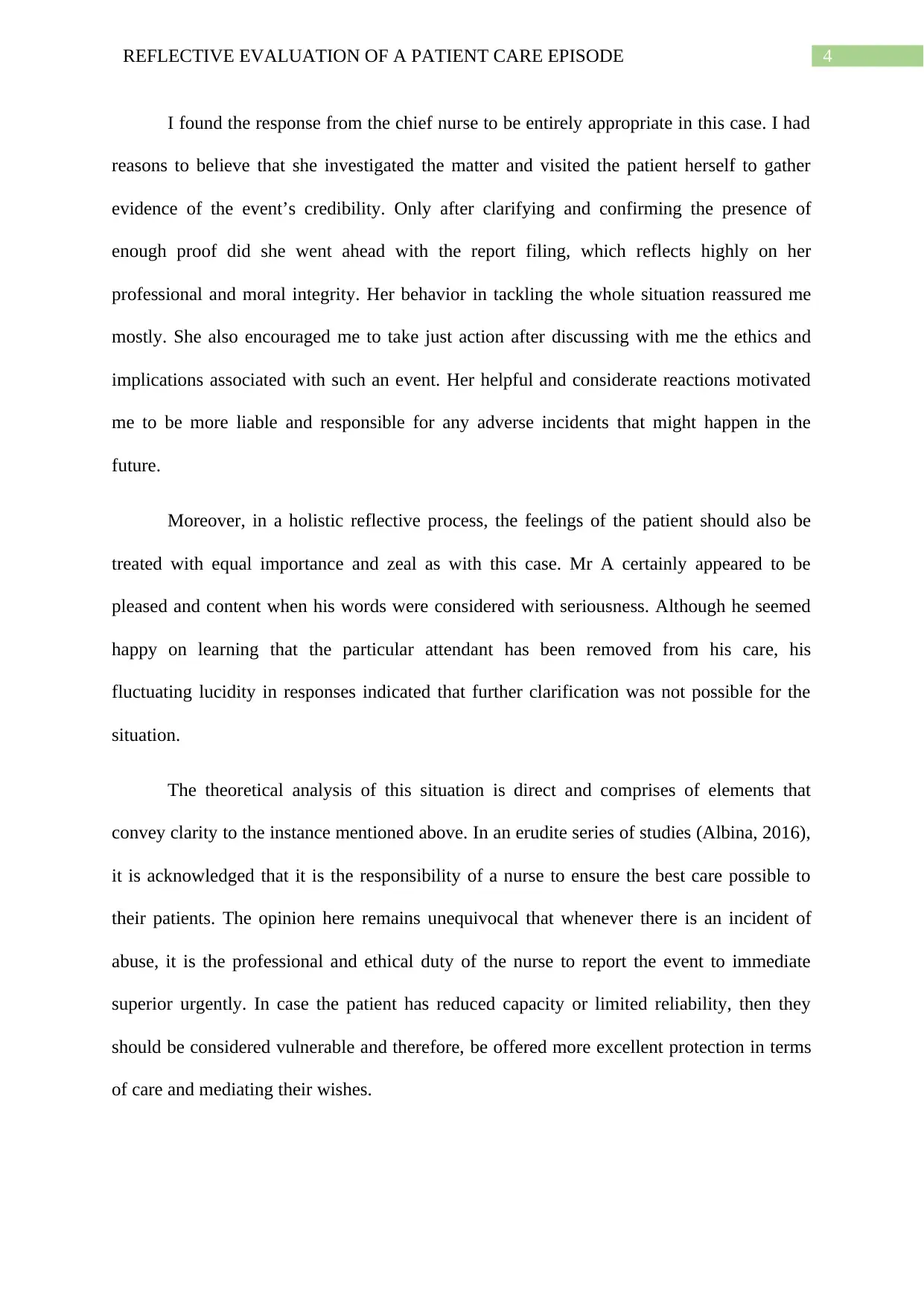
4REFLECTIVE EVALUATION OF A PATIENT CARE EPISODE
I found the response from the chief nurse to be entirely appropriate in this case. I had
reasons to believe that she investigated the matter and visited the patient herself to gather
evidence of the event’s credibility. Only after clarifying and confirming the presence of
enough proof did she went ahead with the report filing, which reflects highly on her
professional and moral integrity. Her behavior in tackling the whole situation reassured me
mostly. She also encouraged me to take just action after discussing with me the ethics and
implications associated with such an event. Her helpful and considerate reactions motivated
me to be more liable and responsible for any adverse incidents that might happen in the
future.
Moreover, in a holistic reflective process, the feelings of the patient should also be
treated with equal importance and zeal as with this case. Mr A certainly appeared to be
pleased and content when his words were considered with seriousness. Although he seemed
happy on learning that the particular attendant has been removed from his care, his
fluctuating lucidity in responses indicated that further clarification was not possible for the
situation.
The theoretical analysis of this situation is direct and comprises of elements that
convey clarity to the instance mentioned above. In an erudite series of studies (Albina, 2016),
it is acknowledged that it is the responsibility of a nurse to ensure the best care possible to
their patients. The opinion here remains unequivocal that whenever there is an incident of
abuse, it is the professional and ethical duty of the nurse to report the event to immediate
superior urgently. In case the patient has reduced capacity or limited reliability, then they
should be considered vulnerable and therefore, be offered more excellent protection in terms
of care and mediating their wishes.
I found the response from the chief nurse to be entirely appropriate in this case. I had
reasons to believe that she investigated the matter and visited the patient herself to gather
evidence of the event’s credibility. Only after clarifying and confirming the presence of
enough proof did she went ahead with the report filing, which reflects highly on her
professional and moral integrity. Her behavior in tackling the whole situation reassured me
mostly. She also encouraged me to take just action after discussing with me the ethics and
implications associated with such an event. Her helpful and considerate reactions motivated
me to be more liable and responsible for any adverse incidents that might happen in the
future.
Moreover, in a holistic reflective process, the feelings of the patient should also be
treated with equal importance and zeal as with this case. Mr A certainly appeared to be
pleased and content when his words were considered with seriousness. Although he seemed
happy on learning that the particular attendant has been removed from his care, his
fluctuating lucidity in responses indicated that further clarification was not possible for the
situation.
The theoretical analysis of this situation is direct and comprises of elements that
convey clarity to the instance mentioned above. In an erudite series of studies (Albina, 2016),
it is acknowledged that it is the responsibility of a nurse to ensure the best care possible to
their patients. The opinion here remains unequivocal that whenever there is an incident of
abuse, it is the professional and ethical duty of the nurse to report the event to immediate
superior urgently. In case the patient has reduced capacity or limited reliability, then they
should be considered vulnerable and therefore, be offered more excellent protection in terms
of care and mediating their wishes.
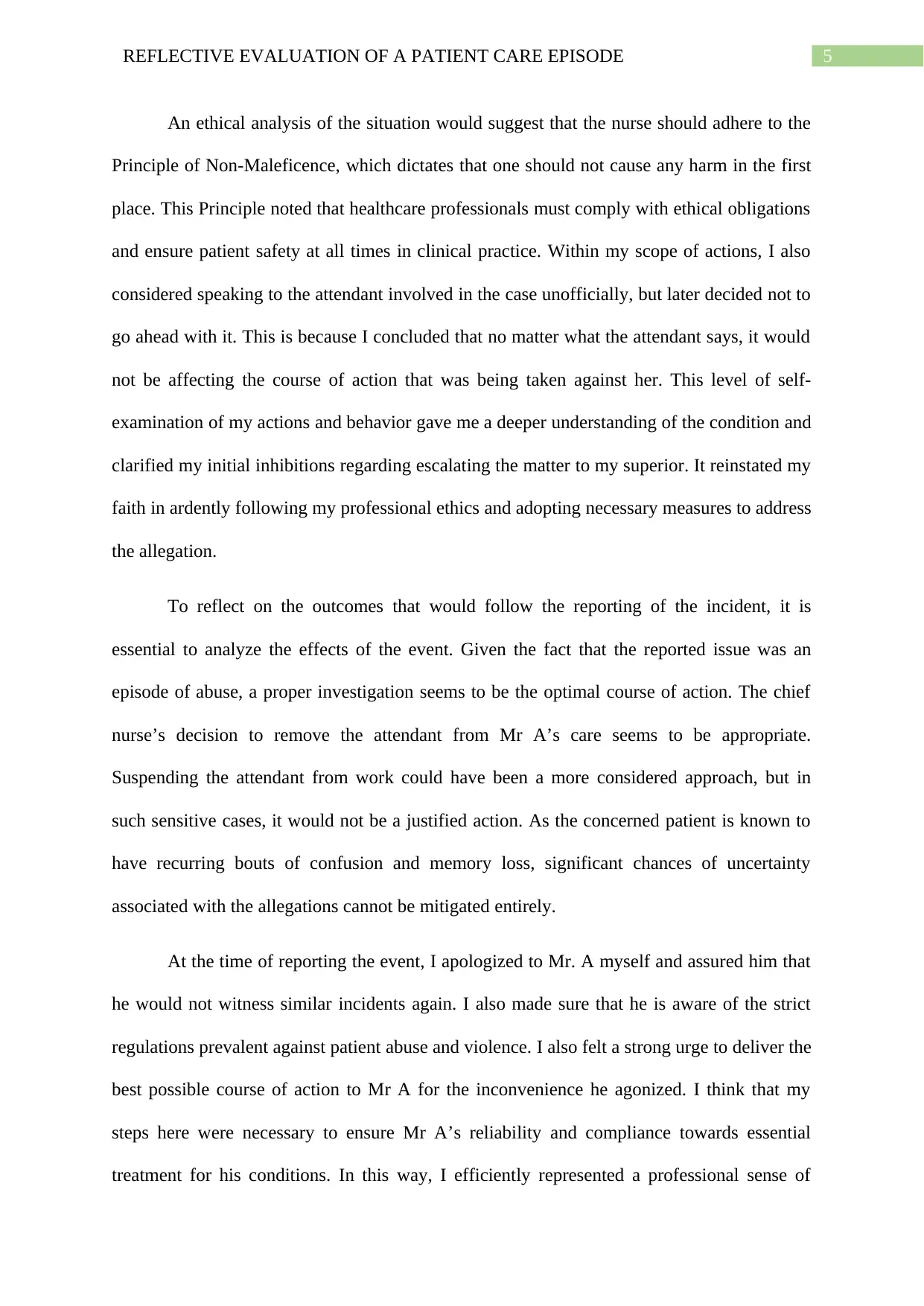
5REFLECTIVE EVALUATION OF A PATIENT CARE EPISODE
An ethical analysis of the situation would suggest that the nurse should adhere to the
Principle of Non-Maleficence, which dictates that one should not cause any harm in the first
place. This Principle noted that healthcare professionals must comply with ethical obligations
and ensure patient safety at all times in clinical practice. Within my scope of actions, I also
considered speaking to the attendant involved in the case unofficially, but later decided not to
go ahead with it. This is because I concluded that no matter what the attendant says, it would
not be affecting the course of action that was being taken against her. This level of self-
examination of my actions and behavior gave me a deeper understanding of the condition and
clarified my initial inhibitions regarding escalating the matter to my superior. It reinstated my
faith in ardently following my professional ethics and adopting necessary measures to address
the allegation.
To reflect on the outcomes that would follow the reporting of the incident, it is
essential to analyze the effects of the event. Given the fact that the reported issue was an
episode of abuse, a proper investigation seems to be the optimal course of action. The chief
nurse’s decision to remove the attendant from Mr A’s care seems to be appropriate.
Suspending the attendant from work could have been a more considered approach, but in
such sensitive cases, it would not be a justified action. As the concerned patient is known to
have recurring bouts of confusion and memory loss, significant chances of uncertainty
associated with the allegations cannot be mitigated entirely.
At the time of reporting the event, I apologized to Mr. A myself and assured him that
he would not witness similar incidents again. I also made sure that he is aware of the strict
regulations prevalent against patient abuse and violence. I also felt a strong urge to deliver the
best possible course of action to Mr A for the inconvenience he agonized. I think that my
steps here were necessary to ensure Mr A’s reliability and compliance towards essential
treatment for his conditions. In this way, I efficiently represented a professional sense of
An ethical analysis of the situation would suggest that the nurse should adhere to the
Principle of Non-Maleficence, which dictates that one should not cause any harm in the first
place. This Principle noted that healthcare professionals must comply with ethical obligations
and ensure patient safety at all times in clinical practice. Within my scope of actions, I also
considered speaking to the attendant involved in the case unofficially, but later decided not to
go ahead with it. This is because I concluded that no matter what the attendant says, it would
not be affecting the course of action that was being taken against her. This level of self-
examination of my actions and behavior gave me a deeper understanding of the condition and
clarified my initial inhibitions regarding escalating the matter to my superior. It reinstated my
faith in ardently following my professional ethics and adopting necessary measures to address
the allegation.
To reflect on the outcomes that would follow the reporting of the incident, it is
essential to analyze the effects of the event. Given the fact that the reported issue was an
episode of abuse, a proper investigation seems to be the optimal course of action. The chief
nurse’s decision to remove the attendant from Mr A’s care seems to be appropriate.
Suspending the attendant from work could have been a more considered approach, but in
such sensitive cases, it would not be a justified action. As the concerned patient is known to
have recurring bouts of confusion and memory loss, significant chances of uncertainty
associated with the allegations cannot be mitigated entirely.
At the time of reporting the event, I apologized to Mr. A myself and assured him that
he would not witness similar incidents again. I also made sure that he is aware of the strict
regulations prevalent against patient abuse and violence. I also felt a strong urge to deliver the
best possible course of action to Mr A for the inconvenience he agonized. I think that my
steps here were necessary to ensure Mr A’s reliability and compliance towards essential
treatment for his conditions. In this way, I efficiently represented a professional sense of
⊘ This is a preview!⊘
Do you want full access?
Subscribe today to unlock all pages.

Trusted by 1+ million students worldwide
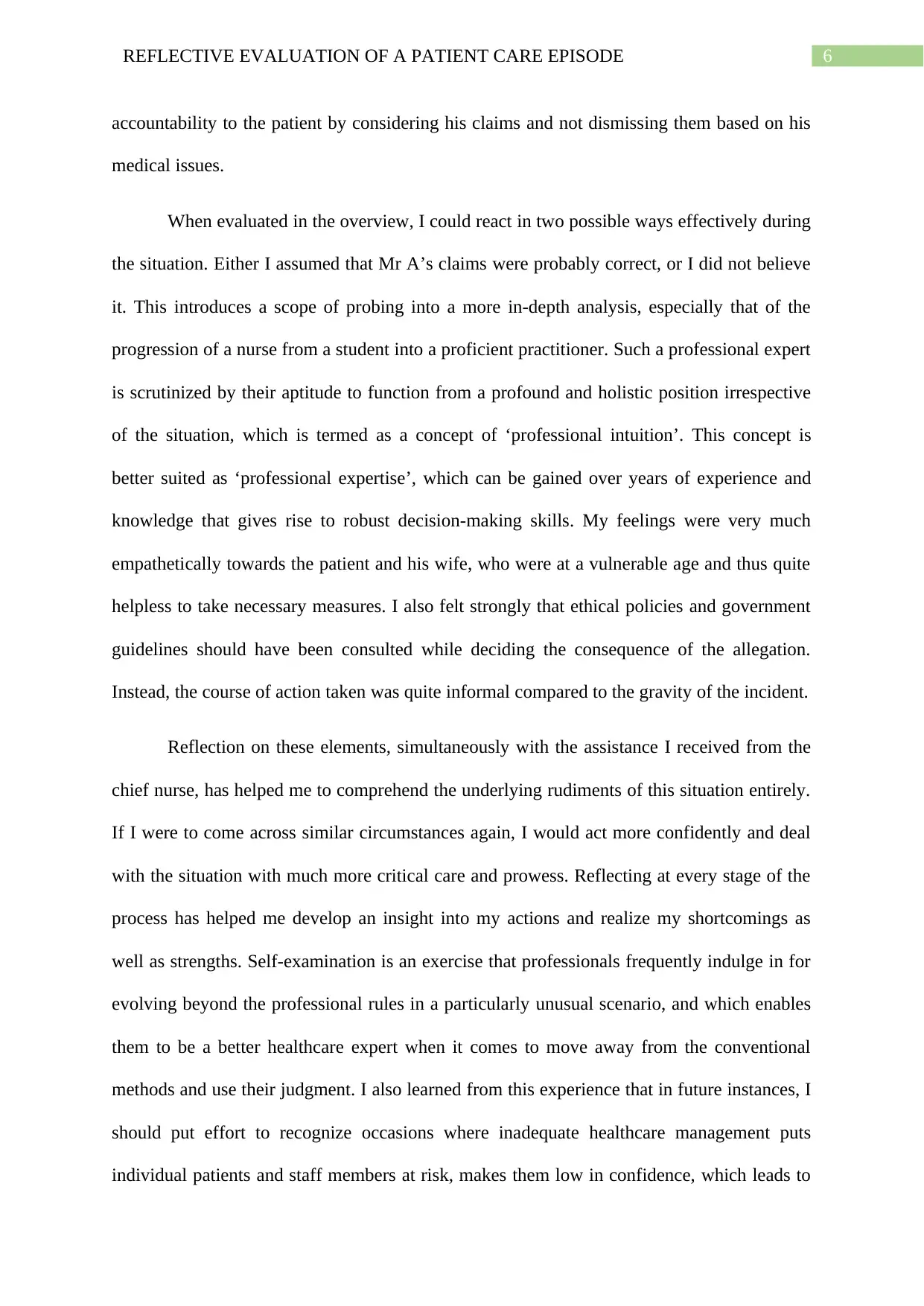
6REFLECTIVE EVALUATION OF A PATIENT CARE EPISODE
accountability to the patient by considering his claims and not dismissing them based on his
medical issues.
When evaluated in the overview, I could react in two possible ways effectively during
the situation. Either I assumed that Mr A’s claims were probably correct, or I did not believe
it. This introduces a scope of probing into a more in-depth analysis, especially that of the
progression of a nurse from a student into a proficient practitioner. Such a professional expert
is scrutinized by their aptitude to function from a profound and holistic position irrespective
of the situation, which is termed as a concept of ‘professional intuition’. This concept is
better suited as ‘professional expertise’, which can be gained over years of experience and
knowledge that gives rise to robust decision-making skills. My feelings were very much
empathetically towards the patient and his wife, who were at a vulnerable age and thus quite
helpless to take necessary measures. I also felt strongly that ethical policies and government
guidelines should have been consulted while deciding the consequence of the allegation.
Instead, the course of action taken was quite informal compared to the gravity of the incident.
Reflection on these elements, simultaneously with the assistance I received from the
chief nurse, has helped me to comprehend the underlying rudiments of this situation entirely.
If I were to come across similar circumstances again, I would act more confidently and deal
with the situation with much more critical care and prowess. Reflecting at every stage of the
process has helped me develop an insight into my actions and realize my shortcomings as
well as strengths. Self-examination is an exercise that professionals frequently indulge in for
evolving beyond the professional rules in a particularly unusual scenario, and which enables
them to be a better healthcare expert when it comes to move away from the conventional
methods and use their judgment. I also learned from this experience that in future instances, I
should put effort to recognize occasions where inadequate healthcare management puts
individual patients and staff members at risk, makes them low in confidence, which leads to
accountability to the patient by considering his claims and not dismissing them based on his
medical issues.
When evaluated in the overview, I could react in two possible ways effectively during
the situation. Either I assumed that Mr A’s claims were probably correct, or I did not believe
it. This introduces a scope of probing into a more in-depth analysis, especially that of the
progression of a nurse from a student into a proficient practitioner. Such a professional expert
is scrutinized by their aptitude to function from a profound and holistic position irrespective
of the situation, which is termed as a concept of ‘professional intuition’. This concept is
better suited as ‘professional expertise’, which can be gained over years of experience and
knowledge that gives rise to robust decision-making skills. My feelings were very much
empathetically towards the patient and his wife, who were at a vulnerable age and thus quite
helpless to take necessary measures. I also felt strongly that ethical policies and government
guidelines should have been consulted while deciding the consequence of the allegation.
Instead, the course of action taken was quite informal compared to the gravity of the incident.
Reflection on these elements, simultaneously with the assistance I received from the
chief nurse, has helped me to comprehend the underlying rudiments of this situation entirely.
If I were to come across similar circumstances again, I would act more confidently and deal
with the situation with much more critical care and prowess. Reflecting at every stage of the
process has helped me develop an insight into my actions and realize my shortcomings as
well as strengths. Self-examination is an exercise that professionals frequently indulge in for
evolving beyond the professional rules in a particularly unusual scenario, and which enables
them to be a better healthcare expert when it comes to move away from the conventional
methods and use their judgment. I also learned from this experience that in future instances, I
should put effort to recognize occasions where inadequate healthcare management puts
individual patients and staff members at risk, makes them low in confidence, which leads to
Paraphrase This Document
Need a fresh take? Get an instant paraphrase of this document with our AI Paraphraser
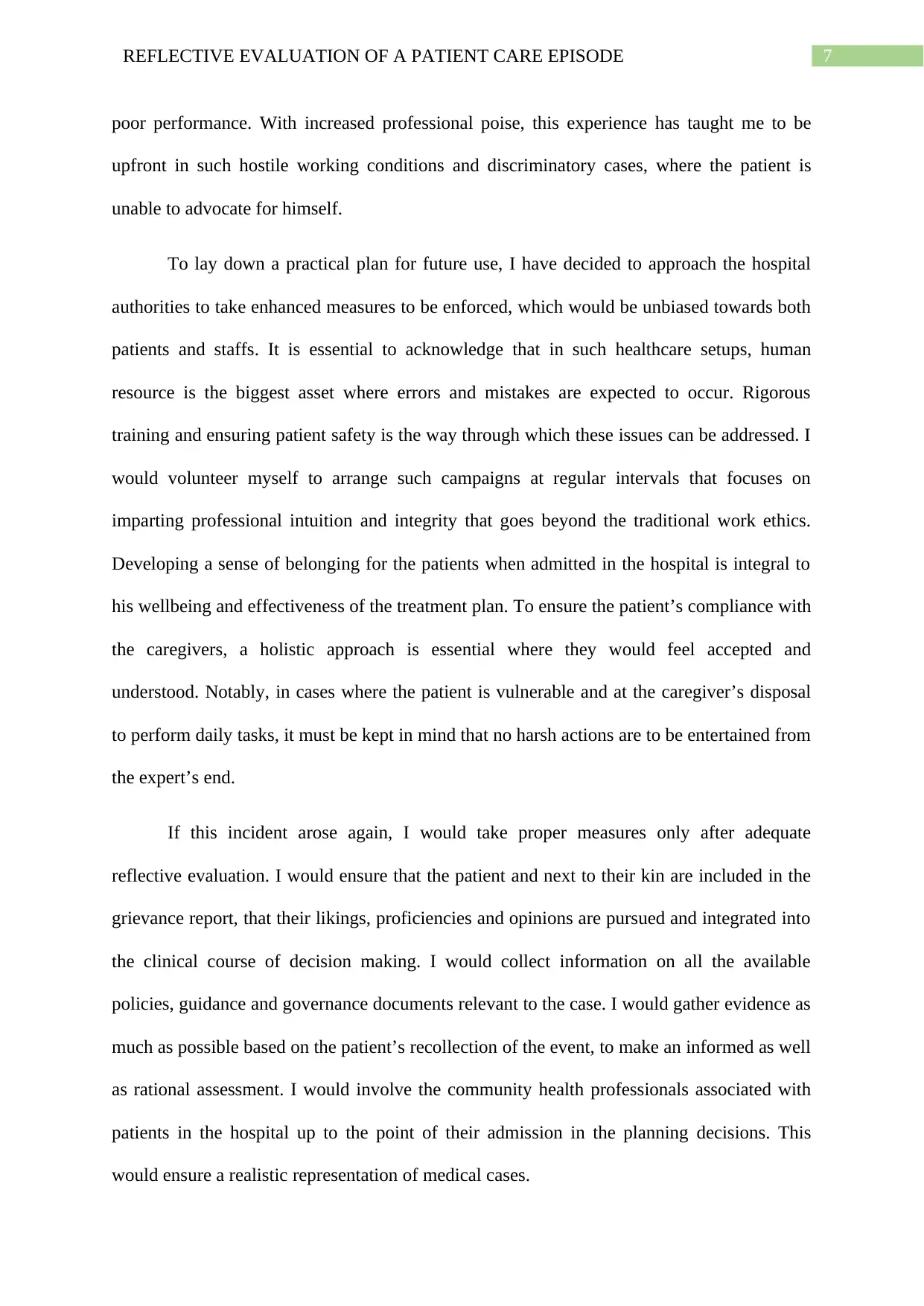
7REFLECTIVE EVALUATION OF A PATIENT CARE EPISODE
poor performance. With increased professional poise, this experience has taught me to be
upfront in such hostile working conditions and discriminatory cases, where the patient is
unable to advocate for himself.
To lay down a practical plan for future use, I have decided to approach the hospital
authorities to take enhanced measures to be enforced, which would be unbiased towards both
patients and staffs. It is essential to acknowledge that in such healthcare setups, human
resource is the biggest asset where errors and mistakes are expected to occur. Rigorous
training and ensuring patient safety is the way through which these issues can be addressed. I
would volunteer myself to arrange such campaigns at regular intervals that focuses on
imparting professional intuition and integrity that goes beyond the traditional work ethics.
Developing a sense of belonging for the patients when admitted in the hospital is integral to
his wellbeing and effectiveness of the treatment plan. To ensure the patient’s compliance with
the caregivers, a holistic approach is essential where they would feel accepted and
understood. Notably, in cases where the patient is vulnerable and at the caregiver’s disposal
to perform daily tasks, it must be kept in mind that no harsh actions are to be entertained from
the expert’s end.
If this incident arose again, I would take proper measures only after adequate
reflective evaluation. I would ensure that the patient and next to their kin are included in the
grievance report, that their likings, proficiencies and opinions are pursued and integrated into
the clinical course of decision making. I would collect information on all the available
policies, guidance and governance documents relevant to the case. I would gather evidence as
much as possible based on the patient’s recollection of the event, to make an informed as well
as rational assessment. I would involve the community health professionals associated with
patients in the hospital up to the point of their admission in the planning decisions. This
would ensure a realistic representation of medical cases.
poor performance. With increased professional poise, this experience has taught me to be
upfront in such hostile working conditions and discriminatory cases, where the patient is
unable to advocate for himself.
To lay down a practical plan for future use, I have decided to approach the hospital
authorities to take enhanced measures to be enforced, which would be unbiased towards both
patients and staffs. It is essential to acknowledge that in such healthcare setups, human
resource is the biggest asset where errors and mistakes are expected to occur. Rigorous
training and ensuring patient safety is the way through which these issues can be addressed. I
would volunteer myself to arrange such campaigns at regular intervals that focuses on
imparting professional intuition and integrity that goes beyond the traditional work ethics.
Developing a sense of belonging for the patients when admitted in the hospital is integral to
his wellbeing and effectiveness of the treatment plan. To ensure the patient’s compliance with
the caregivers, a holistic approach is essential where they would feel accepted and
understood. Notably, in cases where the patient is vulnerable and at the caregiver’s disposal
to perform daily tasks, it must be kept in mind that no harsh actions are to be entertained from
the expert’s end.
If this incident arose again, I would take proper measures only after adequate
reflective evaluation. I would ensure that the patient and next to their kin are included in the
grievance report, that their likings, proficiencies and opinions are pursued and integrated into
the clinical course of decision making. I would collect information on all the available
policies, guidance and governance documents relevant to the case. I would gather evidence as
much as possible based on the patient’s recollection of the event, to make an informed as well
as rational assessment. I would involve the community health professionals associated with
patients in the hospital up to the point of their admission in the planning decisions. This
would ensure a realistic representation of medical cases.
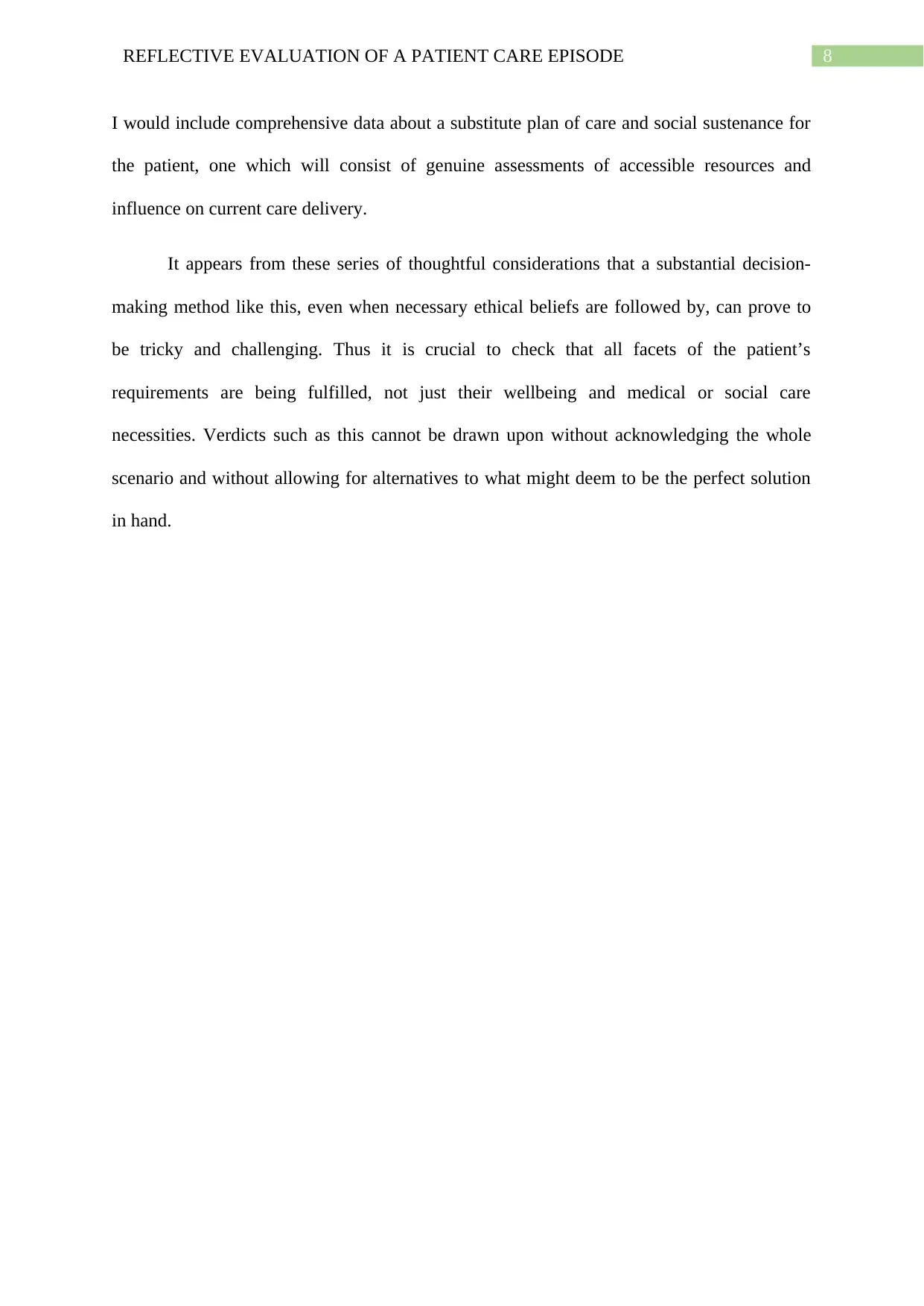
8REFLECTIVE EVALUATION OF A PATIENT CARE EPISODE
I would include comprehensive data about a substitute plan of care and social sustenance for
the patient, one which will consist of genuine assessments of accessible resources and
influence on current care delivery.
It appears from these series of thoughtful considerations that a substantial decision-
making method like this, even when necessary ethical beliefs are followed by, can prove to
be tricky and challenging. Thus it is crucial to check that all facets of the patient’s
requirements are being fulfilled, not just their wellbeing and medical or social care
necessities. Verdicts such as this cannot be drawn upon without acknowledging the whole
scenario and without allowing for alternatives to what might deem to be the perfect solution
in hand.
I would include comprehensive data about a substitute plan of care and social sustenance for
the patient, one which will consist of genuine assessments of accessible resources and
influence on current care delivery.
It appears from these series of thoughtful considerations that a substantial decision-
making method like this, even when necessary ethical beliefs are followed by, can prove to
be tricky and challenging. Thus it is crucial to check that all facets of the patient’s
requirements are being fulfilled, not just their wellbeing and medical or social care
necessities. Verdicts such as this cannot be drawn upon without acknowledging the whole
scenario and without allowing for alternatives to what might deem to be the perfect solution
in hand.
⊘ This is a preview!⊘
Do you want full access?
Subscribe today to unlock all pages.

Trusted by 1+ million students worldwide
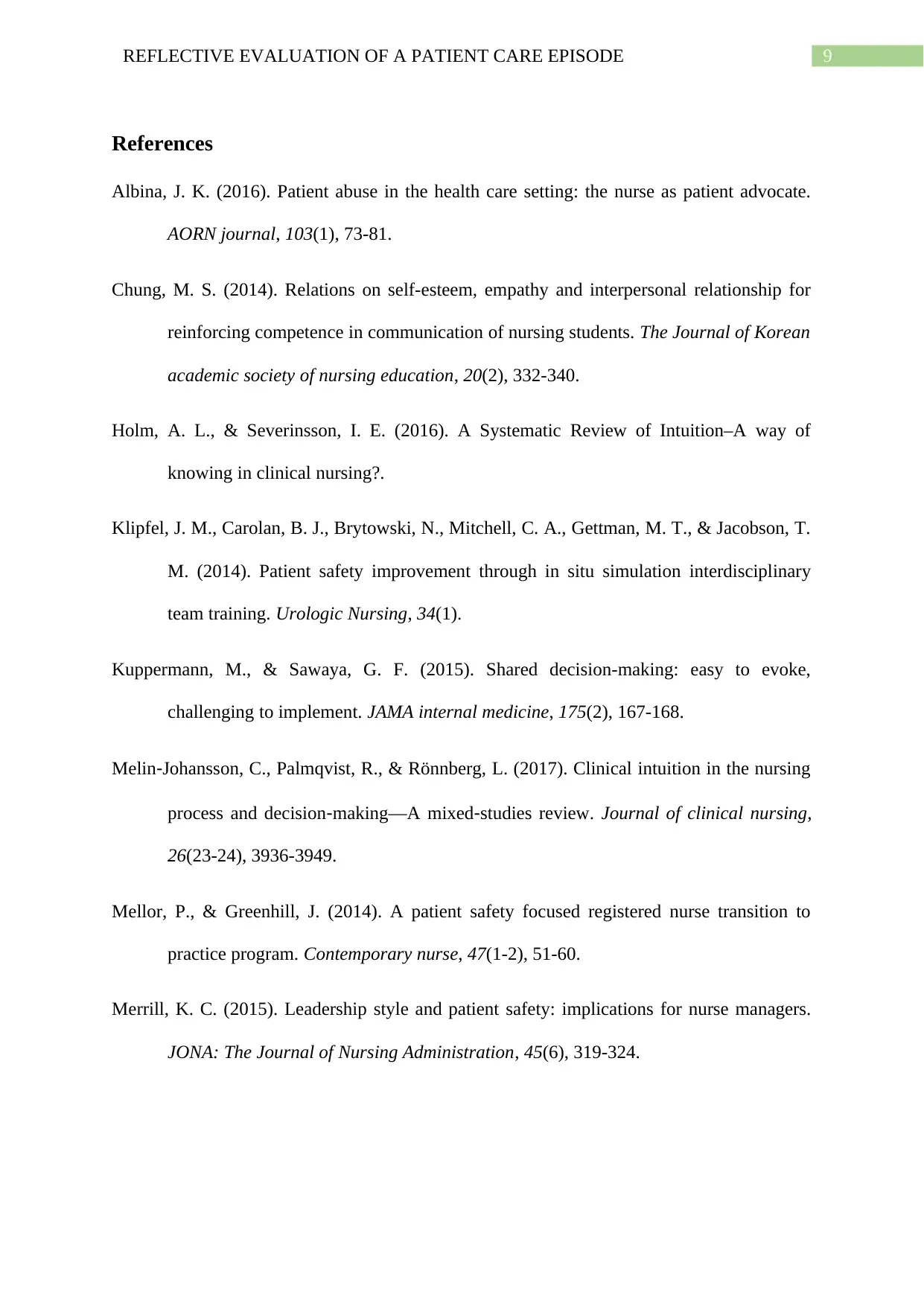
9REFLECTIVE EVALUATION OF A PATIENT CARE EPISODE
References
Albina, J. K. (2016). Patient abuse in the health care setting: the nurse as patient advocate.
AORN journal, 103(1), 73-81.
Chung, M. S. (2014). Relations on self-esteem, empathy and interpersonal relationship for
reinforcing competence in communication of nursing students. The Journal of Korean
academic society of nursing education, 20(2), 332-340.
Holm, A. L., & Severinsson, I. E. (2016). A Systematic Review of Intuition–A way of
knowing in clinical nursing?.
Klipfel, J. M., Carolan, B. J., Brytowski, N., Mitchell, C. A., Gettman, M. T., & Jacobson, T.
M. (2014). Patient safety improvement through in situ simulation interdisciplinary
team training. Urologic Nursing, 34(1).
Kuppermann, M., & Sawaya, G. F. (2015). Shared decision-making: easy to evoke,
challenging to implement. JAMA internal medicine, 175(2), 167-168.
Melin‐Johansson, C., Palmqvist, R., & Rönnberg, L. (2017). Clinical intuition in the nursing
process and decision‐making—A mixed‐studies review. Journal of clinical nursing,
26(23-24), 3936-3949.
Mellor, P., & Greenhill, J. (2014). A patient safety focused registered nurse transition to
practice program. Contemporary nurse, 47(1-2), 51-60.
Merrill, K. C. (2015). Leadership style and patient safety: implications for nurse managers.
JONA: The Journal of Nursing Administration, 45(6), 319-324.
References
Albina, J. K. (2016). Patient abuse in the health care setting: the nurse as patient advocate.
AORN journal, 103(1), 73-81.
Chung, M. S. (2014). Relations on self-esteem, empathy and interpersonal relationship for
reinforcing competence in communication of nursing students. The Journal of Korean
academic society of nursing education, 20(2), 332-340.
Holm, A. L., & Severinsson, I. E. (2016). A Systematic Review of Intuition–A way of
knowing in clinical nursing?.
Klipfel, J. M., Carolan, B. J., Brytowski, N., Mitchell, C. A., Gettman, M. T., & Jacobson, T.
M. (2014). Patient safety improvement through in situ simulation interdisciplinary
team training. Urologic Nursing, 34(1).
Kuppermann, M., & Sawaya, G. F. (2015). Shared decision-making: easy to evoke,
challenging to implement. JAMA internal medicine, 175(2), 167-168.
Melin‐Johansson, C., Palmqvist, R., & Rönnberg, L. (2017). Clinical intuition in the nursing
process and decision‐making—A mixed‐studies review. Journal of clinical nursing,
26(23-24), 3936-3949.
Mellor, P., & Greenhill, J. (2014). A patient safety focused registered nurse transition to
practice program. Contemporary nurse, 47(1-2), 51-60.
Merrill, K. C. (2015). Leadership style and patient safety: implications for nurse managers.
JONA: The Journal of Nursing Administration, 45(6), 319-324.
Paraphrase This Document
Need a fresh take? Get an instant paraphrase of this document with our AI Paraphraser
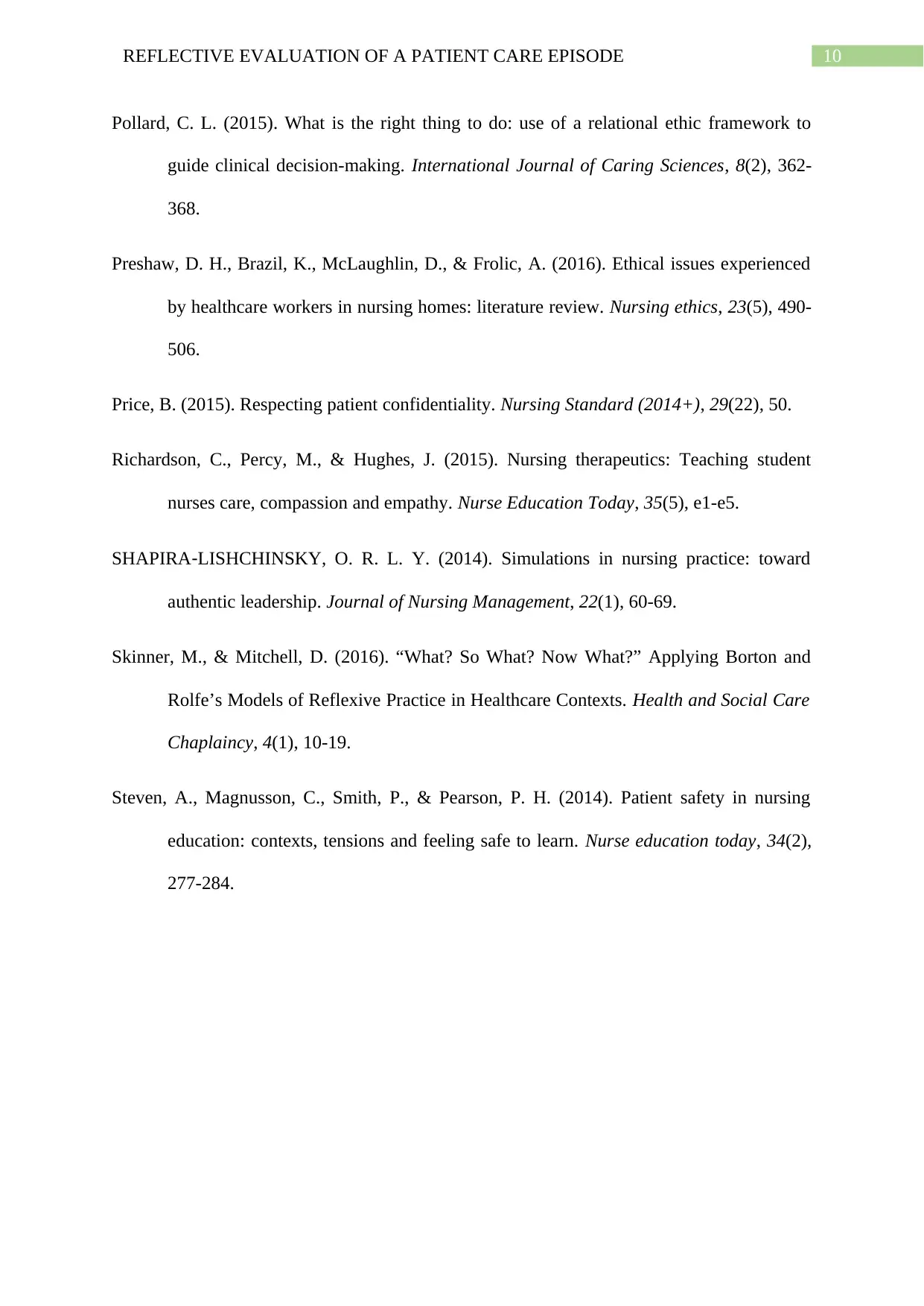
10REFLECTIVE EVALUATION OF A PATIENT CARE EPISODE
Pollard, C. L. (2015). What is the right thing to do: use of a relational ethic framework to
guide clinical decision-making. International Journal of Caring Sciences, 8(2), 362-
368.
Preshaw, D. H., Brazil, K., McLaughlin, D., & Frolic, A. (2016). Ethical issues experienced
by healthcare workers in nursing homes: literature review. Nursing ethics, 23(5), 490-
506.
Price, B. (2015). Respecting patient confidentiality. Nursing Standard (2014+), 29(22), 50.
Richardson, C., Percy, M., & Hughes, J. (2015). Nursing therapeutics: Teaching student
nurses care, compassion and empathy. Nurse Education Today, 35(5), e1-e5.
SHAPIRA‐LISHCHINSKY, O. R. L. Y. (2014). Simulations in nursing practice: toward
authentic leadership. Journal of Nursing Management, 22(1), 60-69.
Skinner, M., & Mitchell, D. (2016). “What? So What? Now What?” Applying Borton and
Rolfe’s Models of Reflexive Practice in Healthcare Contexts. Health and Social Care
Chaplaincy, 4(1), 10-19.
Steven, A., Magnusson, C., Smith, P., & Pearson, P. H. (2014). Patient safety in nursing
education: contexts, tensions and feeling safe to learn. Nurse education today, 34(2),
277-284.
Pollard, C. L. (2015). What is the right thing to do: use of a relational ethic framework to
guide clinical decision-making. International Journal of Caring Sciences, 8(2), 362-
368.
Preshaw, D. H., Brazil, K., McLaughlin, D., & Frolic, A. (2016). Ethical issues experienced
by healthcare workers in nursing homes: literature review. Nursing ethics, 23(5), 490-
506.
Price, B. (2015). Respecting patient confidentiality. Nursing Standard (2014+), 29(22), 50.
Richardson, C., Percy, M., & Hughes, J. (2015). Nursing therapeutics: Teaching student
nurses care, compassion and empathy. Nurse Education Today, 35(5), e1-e5.
SHAPIRA‐LISHCHINSKY, O. R. L. Y. (2014). Simulations in nursing practice: toward
authentic leadership. Journal of Nursing Management, 22(1), 60-69.
Skinner, M., & Mitchell, D. (2016). “What? So What? Now What?” Applying Borton and
Rolfe’s Models of Reflexive Practice in Healthcare Contexts. Health and Social Care
Chaplaincy, 4(1), 10-19.
Steven, A., Magnusson, C., Smith, P., & Pearson, P. H. (2014). Patient safety in nursing
education: contexts, tensions and feeling safe to learn. Nurse education today, 34(2),
277-284.
1 out of 11
Related Documents
Your All-in-One AI-Powered Toolkit for Academic Success.
+13062052269
info@desklib.com
Available 24*7 on WhatsApp / Email
![[object Object]](/_next/static/media/star-bottom.7253800d.svg)
Unlock your academic potential
Copyright © 2020–2025 A2Z Services. All Rights Reserved. Developed and managed by ZUCOL.





